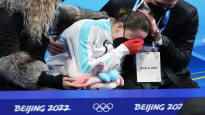The atmosphere was funeral, although the Russians took a double victory at the Olympics. The case of Kamila Valijeva is its own chapter, but the collapse of the silver medalist does not give a healthy picture of the sport, writes Jelena Leppänen.
The figure skating of the Beijing Olympics will not go down in history as fine performances, the first successful four-jumps at the Olympics, or bright athletes.
Few people who have watched the most talked about doping saga at the Olympics may be aware of how talented an athlete is being talked about in Valijeva. The Kazan-based skater attracted attention already at the age of 4–5, but not so much with his technical performances or jumps, but with his elasticity and ability to experience music with his whole soul.
It is precisely the interpretation and the far-reaching love for the species that have been Valijeva’s great strength despite her young age. There was nothing left of them in the short and free programs of the Olympics.
The four-place finish at the Olympics wasn’t what all the super talent who clearly won their race of the season went to get. However, that, too, was a miracle, given the pressures that had accumulated on Valijeva’s shoulders in just over a week.
Prior to the women’s race, the young athlete spent seven hours alone hearing the International Court of Appeal for Sport (CAS).
The investigation into the doping case is still in its infancy, but one can only hope that in the future the adults around him will be in the spotlight and hard questions instead of Valijeva.
Some of Russia’s well-known sports names have blamed the fate of the skater on the international sports community such as the International Olympic Committee and the World Anti-Doping Agency. However, the commentary on the state channel Match TV commented on the situation in its Instagram publication Dmitry Shnjak:
There is a lot of talk about Valijeva’s talent. — There is a lot of talk that journalists destroyed the child. — There is a lot of talk that sports bosses destroyed the child. — In the midst of all this, however, there is so little talk that one of the coaches or doctors gave Valijeva drugs.
For the trace was found. Of late, early, little, much, equally evidence was found. Just like hell, the substance affects a skater’s performance. If the substance is banned and found in the test, questions should be directed to the adults surrounding the minor. Had it not been for this discovery, there would have been nothing else, this so-called “destruction of the child.”
An impossible gold goal?
Valijeva was not the only broken Russian skater after the free program. Same with the teen star, coach Ether Etherberidzen 17-year-olds practicing in the group Anna Shtsherbakova and Aleksandra Trusova took a double win. However, the atmosphere after the results was resolved was reminiscent of a funeral instead of an Olympics.
The flowering of the medalists had to wait for the reaction of the toad silver medalist Trusova. The skater cried hysterically again after one gold seam passed.
According to Russian media, Trusova recently announced after the race that she hated everyone and everything, including figure skating.
There is basically a natural reason for the violent reaction. Ambitious Trusova, like Valijeva, was mind-boggling as a child. Tutberidzen and coach Sergei Dudakovin the jump miracle he refined in his junior years garnered praise with four jumps and performances at the most technically difficult end.
In adult value competitions, competitive pressures have become too intense. The crashes and overcrowding have resulted in Trusova having “only” two European Championship bronzes and one World Championship bronze in her account before this Olympic silver.
17-year-old Trusova has stubbornly sought the brightest crown for her career. He insisted on making four four-jumps in the Olympic free program sounding absurd, even though the coaching staff and Eteri Tutberidze himself felt that it would have been smarter to facilitate an extremely consuming and risky program.
Trusova kept her head, partly because the four jumps get such good technical points compared to everything else, partly because she wanted to make skating history. Trusova did history. She became the first woman to have made five quadruple jumps in her program, but it wasn’t enough for gold.
The reaction was consistent. Two broken Russian athletes united by basically the same pain were seen at Beijing’s Capital Indoor Stadium on Thursday. Both understand that a new Olympic opportunity would be a struggle against probabilities under current rules.
Ask though Alina Zagitovalta, From the Tutberidze Shelter, which won gold at Pyeongchang at the age of 15 four years ago. Zagitova was left on an unspecified break from competitions just a couple of years after her Olympic victory due to severe injuries and mental exhaustion.
In Pyeongchang, silver has reached the age of 18 Yevgeny Medvedevan his career has also been a battle with severe back and leg injuries in recent years.
At the Beijing Games, both Zagitova, 19, and Medvedeva, 22, were in the role of a TV expert. Both have admitted that they would have no chance of competing in quadruple jumps against the great teenages of today.
The fate of previous stars shows how devastating the game has been in the figure skating arenas. In the sport, the youngest, physically undeveloped skaters are best rewarded for their performance.
With the increase in height and weight gain brought on by adolescence, severe injuries and threads of injury enter the picture. Too many careers end at the age of less than 20.
This means that in practice there is only one chance for an athlete’s biggest dream, achieving Olympic gold.
It is anything but healthy.
